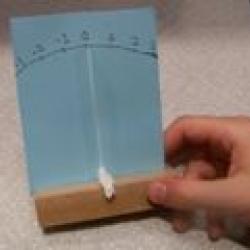Source Institutions
Source Institutions
Add to list Go to activity
Activity link broken? See if it's at the internet archive

In this activity, learners explore the devices used over time to measure changes in temperature. Learners work in teams of "engineers" to design and build their own temperature gauge out of everyday items. They explore how various materials change when temperatures decrease, evaluate their results, and present reflections to the group.
- Under 5 minutes
- 1 to 2 hours
- $1 - $5 per group of students
- Ages 8 - 18
- Activity, Experiment/Lab Activity, Lesson/Lesson Plan
- English
Quick Guide
Materials List (per group of students)
- Student Resource Sheets
- Student Worksheets
- Thermometer (used as reference to actual temperature)
- Access to freezer
- Access to refrigerator or cooler filled with ice
- Wooden stick
- Plastic tape
- Cardboard
- Pen
- Pencil
- Ruler
- Foil
- Paper
Subjects
-
Engineering and Technology
-
Engineering
- Bioengineering/Biomedical Engineering
- Metallurgy and Materials Engineering
-
Technology
- Medical Technology
- Information and Communication
- Manufacturing
-
Engineering
-
Mathematics
-
Data Analysis and Probability
- Data Analysis
- Data Collection
-
Measurement
- Units of Measurement
-
Data Analysis and Probability
-
Physical Sciences
-
Heat and Thermodynamics
- Heat and Temperature
- Heat Transfer
- Motion and Forces
- States of Matter
-
Structure and Properties of Matter
- Atomic Structure
-
Heat and Thermodynamics
-
The Nature of Science
-
The Scientific Process
- Asking Questions
- Conducting Investigations
- Gathering Data
- Formulating Explanations
- Communicating Results
- Science as a Career
-
The Scientific Process
-
The Nature of Technology
-
Technology and Society
- Impacts of Technology
-
The Design Process
- Research and Development
- Invention and Innovation
- Problem Solving
- Troubleshooting and Maintenance
-
Technology and Society
Audience
To use this activity, learners need to:
- see
- read
- touch
Learning styles supported:
- Involves teamwork and communication skills
- Involves hands-on or lab activities
Other
Components that are part of this resource:
Includes alignment to state and/or national standards:
This resource is part of:
Access Rights:
- Free access
By:
Rights:
- All rights reserved, IEEE,
